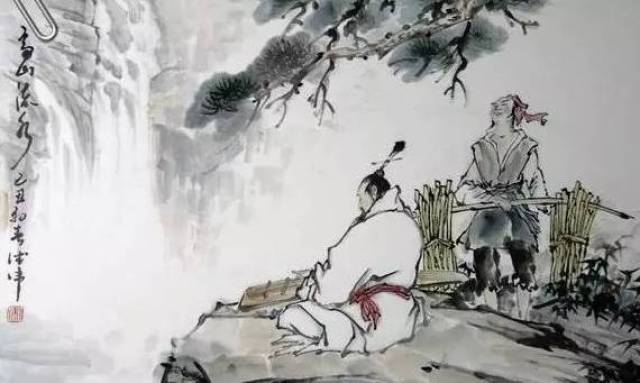成语故事:高山流水
春秋时,琴师俞伯牙在山里弹琴,樵夫钟子期路过,当俞伯牙心中边想高山边弹琴的时候,钟子期说,琴声表现的是巍峨的高山 ;当俞伯牙心中边想大海边弹琴的时候,钟子期说,琴声表现的是浩荡的流水。俞伯牙很惊讶,认为钟子期是他的知音。两人约好下次再见面听琴。不幸届时钟子期已死,俞伯牙非常痛心,摔琴叹息,发誓再不弹琴。后来“高山流水”比喻乐曲高妙,更多比喻朋友知己心心相印。


Alta montanha e água corrente
Durante o período histórico da Primavera e Outono (770-476 a.C.), um músico chamado Yu Boya tocava o qin (instrumento musical de sete cordas) nas montanhas quando um lenhador chamado Zhong Ziqi passava por ali. Enquanto Yu Boya tocava o qin, ele imaginava montanhas altas e mares distantes, e disse a Yu que a música dele evocava imagens de montanhas imponentes e águas caudalosas. Yu Boya se supreendeu pela forma como Zhong descrevia sua música e considerou-o um amigo de verdade. Depois disso, eles combinaram de voltar a se encontrar para ouvir a música de Yu, mas infelizmente Zhong faleceu antes do reencontro. Entristecido, Yu cortou as cordas do qin, suspirou e prometeu que nunca mais voltaria a tocar aquela música. Desde então, a expressão高山流水gao shan liu shui (alta montanha e água corrente) tem sido usada para descrever melodias sublimes, mas também é comumente usada para descrever uma amizade com mútua afinidade.
High Mountains and Flowing Water
Sometime during the Spring and Autumn Period (770-476 BC), a musician called Yu Boya was playing his qin (a seven-stringed plucked instrument) in the mountains, when a woodcutter called ZhongZiqi walked by. While playing his qin, Yu Boya thought of high mountains and broad seas, and Zhong said, the music conjured up images of towering mountains and vast flowing waters. Yu Boya was amazed by how Zhong related to his music and regarded him as a bosom friend. They agreed to meet again to listen to Yu’s music, but sadly Zhong passed away before they could meet. Yu was overwhelmed with grief and broke the strings of his qin, he sighed and vowed never to play the music again. Since then, the idiom of “high mountains and flowing water” has been used to describe sublime melodies, but is more commonly used to describe a friendship with mutual affinity.
Visit 孔子学院 for more.